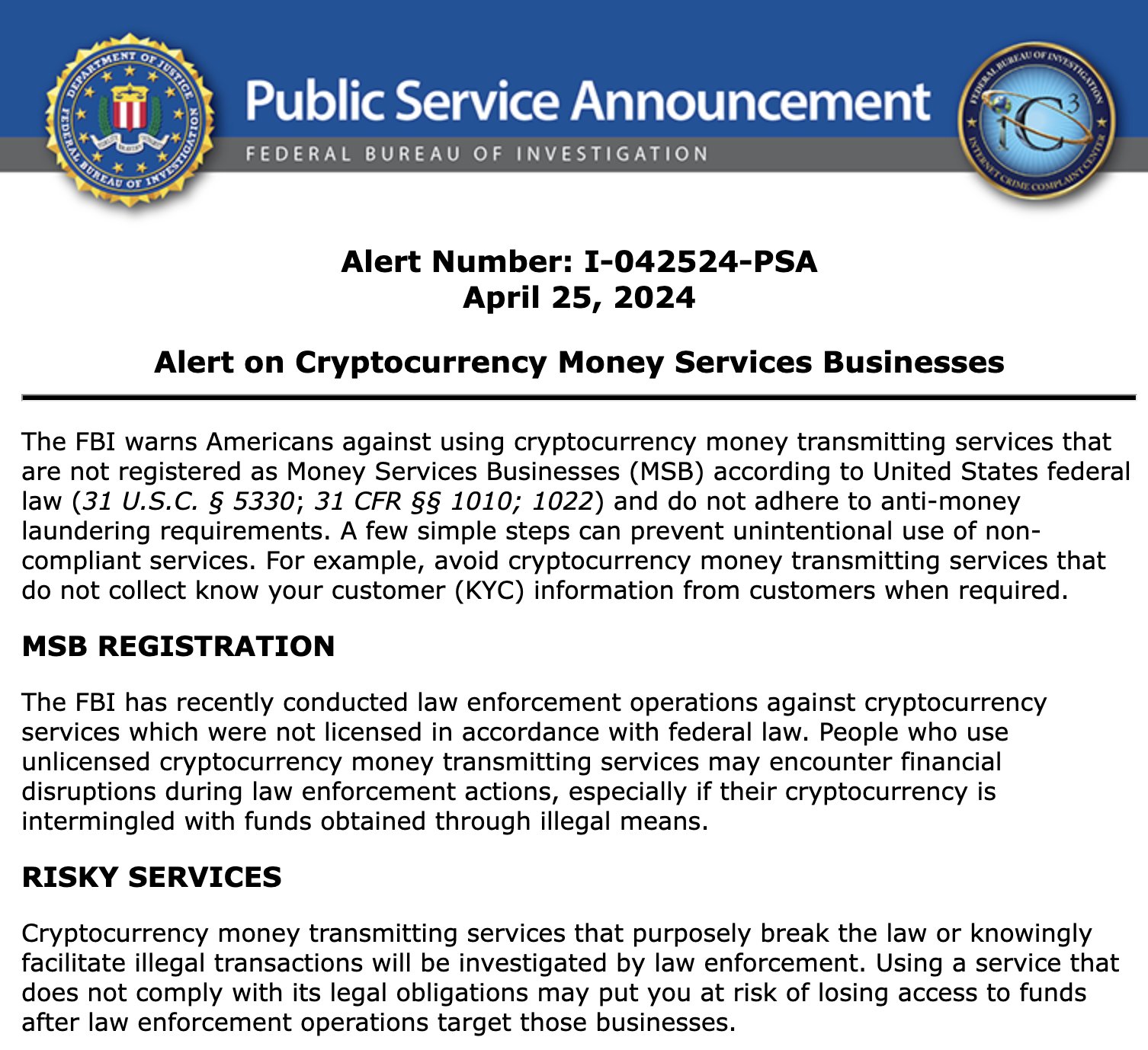Key Points
- The FBI has just released a Public Service Announcement issuing an alert on crypto money service businesses.
- Americans are warned against using crypto services that do not ask for KYC information.
The FBI has just issued a Public Service Announcement, alerting Americans against using crypto money transmitting services that are not registered as Money Service Businesses (MSB), according to the US federal law, and do not adhere to anti-money laundering requirements.
The note reveals an example, stating that people should avoid crypto money transmitting services that do not collect the know-your-customer info (KYC) for customers when required.
In the official note, the FBI references recent law enforcement operations that they have conducted against crypto services that were not licensed in accordance with federal law. They say that people who use unlicensed crypto money transmitting services could encounter financial disruptions during law enforcement actions.
They also note that crypto money transmitting services that purposely break the law or knowingly facilitate illegal transactions will be investigated by law enforcement. The FBI notes that using a service that does not comply with its legal obligations may put people at risk of losing access to funds after law enforcement operations target those businesses.
At the end of their note, the FBI offers “tips to protect” users. They advise against the use of crypto services that “do not ask for KYC information including name, date of birth, address, and ID before allowing you to send or receive money or cryptocurrency.”

MetaMask strikes back following US SEC accusations
Meanwhile, it has been reported that the US SEC is going after MetaMask, accusing it of acting as an unlicensed Broker Dealer engaged with trading securities on behalf of clients.
A broker dealer is a financial entity engaging with trading securities on behalf of clients, but which may also trade for itself. It acts as a broker or agent when it executes orders on behalf of its clients and as a dealer or principal when it trades for its own account.
In response, Consensys, the Ethereum startup behind MetaMask wallet is suing the SEC over regulatory overreach.
In a post on X, they note that the goal behind their move is to ensure that Ethereum remains a vibrant and indispensable blockchain platform. Also, they want to preserve access for the countless developers, market participants, and institutions that have a stake in the world’s second-largest blockchain.
Today, Consensys filed a lawsuit against the Securities and Exchange Commission.
The goal behind this is to ensure that Ethereum remains a vibrant and indispensable blockchain platform and to preserve access for the countless developers, market participants, and institutions…
— Consensys (@Consensys) April 25, 2024
The team at Consensys released a note in which they addressed suing the SEC to defend the US Ethereum Community.
Joe Lubin, co-founder of Ethereum and founder/CEO of Consensys, says:
“We don’t take this step lightly, but we feel compelled to act. Ethereum is for everyone.”
A couple of weeks ago, The United States Securities and Exchange Commission (SEC) has issued a Wells notice to the Uniswap DeFi exchange.
The founder and CEO of Uniswap, Hayden Adams, addressed the move made by the SEC on X, explaining that the products they are offering are legal and their work is “on the right side of history.”
Through all these moves made by the authorities, it becomes clear that the right to privacy for people is under attack as more privacy-centered crypto businesses are accused or shut down.
DOJ arrests Samourai Wallet founders
The FBI’s warning comes as the other day, the Department of Justice arrested the Samourai Wallet founders on charges of money laundering.
Keonne Rodriguez and William Lonergan Hill, founders of privacy-focused Bitcoin wallet and mixer Samourai Wallet, were accused of money laundering and operating an unlicensed money-transmitting business.
DOJ mentioned the company’s disregard for regulation and concluded that Samourai Wallet is closed for business.
FBI Assistant Director in Charge said that threat actors are using technology to evade law enforcement detection and create environments conducive to criminal activity.
Crypto community fights back, defends privacy rights
The crypto community is fighting back, noting that if the FBI were honest and cared about its credibility, they would also tell Americans to use software that is open source and well-audited, non-custodial, and does not collect data, as KYC is a red flag.
According to the crypto community, KYC is the element that violates people’s privacy, which is a fundamental right.
Recently, Edward Snowden also addressed the latest DOJ move against Samourai Wallet. He said that the DOJ has once again criminalized the developers of an application that restores financial privacy.
He highlighted that the way to fix this is to make money private by default. Snowden said that privacy must never be exceptional, because it will be made criminal.
The Department of "Justice" has once again criminalized the developers of an app that restores financial privacy. The way to fix this it to make money private by default. Privacy must never be "exceptional," or they will make it criminal.
— Edward Snowden (@Snowden) April 24, 2024
Recently, Snowden raised awareness about how the NSA is just a few days from “taking over the Internet.”
Not too long ago, the importance of privacy was also addressed by Telegram CEO Pavel Durov, who said that Bitcoin and crypto-like innovative technologies could ensure ways to fight the monitoring of people’s Internet activity that breaks the fundamental right to privacy.






